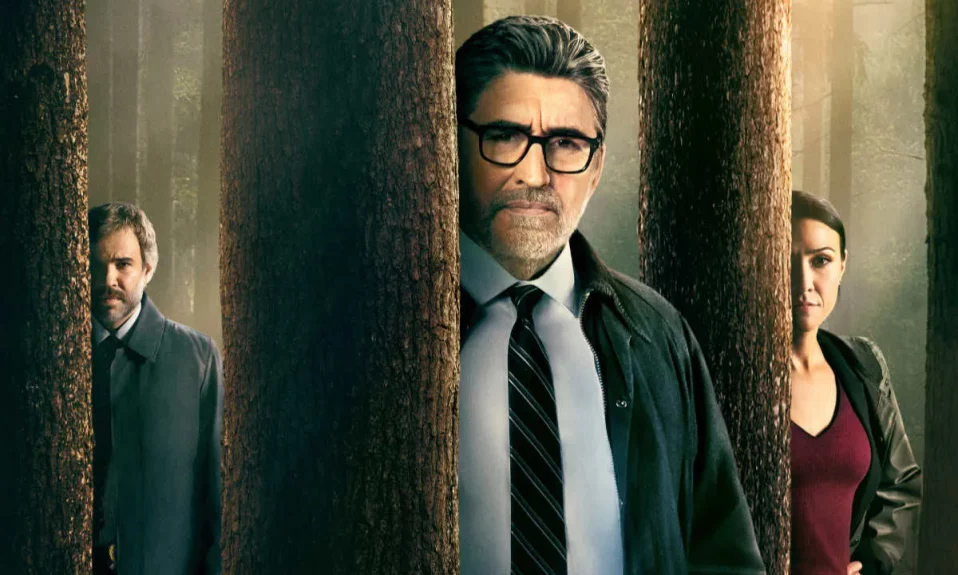The bucolic exterior of the building is surrounded by hanging red dresses, an artistic installation that serves as a reminder of Indigenous women missing in Canada. According to governmental data, around 4,000 Indigenous women and girls are believed to have been murdered or disappeared in Canada in the last three decades. The images don’t come from the news but from the quiet and yet powerful mystery series Three Pines (2022) which suffered premature cancellation after its premiere season, thus remaining a miniseries.
Three Pines by Amazon Prime Video is headed by renowned veteran British actor Alfred Molina (Spider-Man: No Way Home) who plays Chief Inspector Armand Gamache, a character hailing from detective novels authored by Louise Penny. Gamache is a member of the Sûreté du Québec and investigates homicides in the countryside village of Three Pines, located in Quebec Canada. There are four murders divided into 8 episodes, still, the parallel investigation of a missing Indigenous young woman drives the whole series.
Gamache leads the team composed of detectives Isabelle Lacoste (Elle-Máijá Tailfeathers), Jean-Guy Beauvoir (Rossif Sutherland) and Agent Yvette Nichol (Sarah Booth), the latter is very competent as the comic relief. The main cast is rounded by the villagers: cultural curator Bea Mayer (Tantoo Cardinal), writer Ruth Zardo (Clare Coulter), painter Clara Morrow (Anna Tierney) and choir singer Crie (Roberta Battaglia).
The series is more focused on solving crimes through the intelligence and detective skills of the team than applying gratuitous violence, still, it is gripping on how it deals with trauma and the mental health of the characters, in particular Indigenous peoples’ pain.
It not only touches on the issue of missing Indigenous women but the drama of the secluded Canadian Indian Residential Schools for Indigenous children that would take them away from their communities and force European values, as also physical and psychological punishment on them.
HBO’s ‘Watchmen’ (2019) and ‘Lovecraft Country’ (2020) employed works of fiction to highlight the 1921 Tulsa Race Massacre and the carnage that destroyed those Black lives. Three Pines in a similar way brings to the audiences the real horror that are the ‘Canadian Indian Residential Schools.’
A government-funded structure that owns the abhorrent estimation of having between 3,200 to 6,00 students dead on its premises while having forced more than 150,000 First Nations, Métis and Inuit children in its program between the 1870s and 1997.
Only last year, Pope Francis acknowledged the role of the Catholic church in a system that promoted trauma, abuse and genocide while also having a policy of assimilation and enfranchisement that undermined the languages, cultures and philosophies of Indigenous folks. But Indigenous pain is not something relegated just to the past.
In the series the disappearance of Indigenous girl Blue Two-Rivers (Anna Lambe) shows how Canadian law enforcement can be neglectful and even abusive towards Indigenous lives and the backlash that leaves their families asunder, here played by Georgia Lightning, Crystle Lightning and Isabel Deroy-Olson. A pain that is also shared by Mayer as the talented veteran Tantoo Cardinal (‘Dance With Wolves’ (1990) and ‘Legends of the Fall’) expresses sorrow in her acting through anxious eyes alternating with a paused speech, one of the best interpreters of a well-rounded ensemble.
Another positive aspect of the show is having an Indigenous detective solving the case as happens with Lacoste, which justifies how painful for Tailfeathers the axing of the show was as pointed out on her Instagram, because it is not only a shot for an Indigenous woman to play the lead but also to tell nuanced Indigenous stories. The show also gained a lot by having among its directors, the Mohawk community member Tracey Deer who brings an authentical view to the forefront.
The series also deals with other dark subjects such as suicide, parental neglect, police corruption, addiction and so on, without trying to lecture. In the world of ‘Three Pines’ the psychological burdens can be as harmful as physical violence and even law enforcement agents like Gamache and Lacoste are susceptible to them. Three Pines doesn’t fall into the entrapment of forgetting the entertaining aspects to the series, however, it rightly focuses on the ordeals of those who are wronged be they Indigenous or non-Indigenous peoples. Aesthetically, Three Pines has strong cinematography, showing how ‘dark’ and dangerous days of snow can be and how a bucolic scenario can hide dangerous spots with lighting and camera angles. Although cancelled, Three Pines should be seen as an interesting series of detective procedurals that has a legacy of bringing to the spotlight the lives of those who not long ago were just there to be shot by cowboys; in Three Pines they are seen as complex and layered individuals just like any other character.
Also Read: City of God: 20 Years Later












